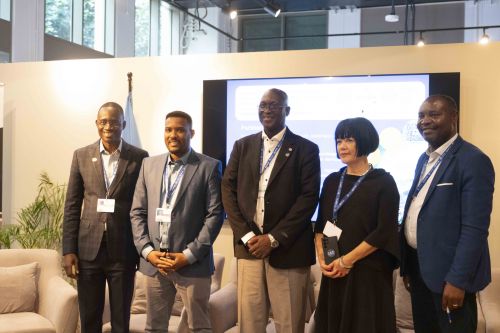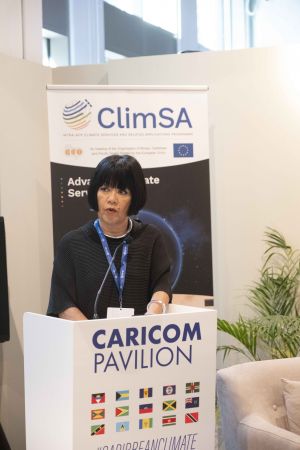The Intra-ACP ClimSA event held at the Caribbean Pavilion on 09 December 2023 brought together a high-level panel to discuss and exchange experiences in the co-design, co-production, and application of climate services in specific socio-economic sectors. Focused on agriculture, water, energy, and health, the event aimed to strengthen South-South cooperation within and between OACPS' Small Island Developing States (SIDS). This initiative sought to establish a robust User Interface Platform for the co-production of tailored climate services and related applications to drive climate adaptation action.

Ms Pratt the Assistant Secretary General of OACPS Secretariat in her opening remarks stated that: “We hope this enable the sharing of best practices and lessons learned in the establishment and strengthening of user interface platforms in and across OACPS Regions. For instance, the ways feedback mechanism(s) for collecting user requirements and integrating these into improved climate service development processes are being implemented by the various RCCs would be invaluable.”
OACPS' Regional Climate Centres (RCCs) for African, Caribbean, and Pacific SIDS played a central role in sharing and exchanging experiences related to unlocking the adaptive potential of ACP regions. OACPS RCCs highlighted the challenges and benefits of involving end-users in the co-design and co-production processes. The primary focus was on establishing an effective feedback mechanism for collecting user requirements and integrating them into improved climate service development.
The panel featured esteemed experts, including the Intergovernmental Authority on Development Climate Prediction and Applications Center (ICPAC), AGRHYMET, the Secretariat of the Pacific Regional Environment Programme (SPREP), , and Dr. Faka (Team Leader ClimSA OACPS).
Dr Faka emphasized the significance of the Intra-ACP ClimSA event at the CARICOM Pavilion, focusing on discussing and exchanging experiences to develop and strengthen "use interface platforms." These platforms are crucial to ensuring that timely and appropriate climate services reach all users for better decisions, ultimately contributing to the sustainability and resilience of countries, communities, and businesses.
Dr. Lona, the Climate Expert from CILSS/AGRHYMET RCC-WAS (western Africa and Sahel) , shed light on the South-South Cooperation within and between OACPS' SIDS, specifically focusing on the challenges faced by User Interface Platforms (UIP) in Western Africa. In this region, there are several well-established and functional Regional and National Users Interface Platforms (UIPs) that play a crucial role in disseminating climate and related information at various levels and across sectors such as agriculture, food security, water resources, disaster risk reduction, and more. The overarching objective of these platforms is to coordinate institutions, fostering collaboration to co-design, co-produce, communicate, deliver, and utilize climate services for decision-making in sensitive socio-economic sectors. This collaborative effort aims to reduce the negative effects of climate-related disasters, mitigate impacts on food security and health, and enhance the sustainable management of water resources.
Dr. Lona highlighted the existing Regional UIPs and initiatives, such as the Regional Climate Outlook Forums (RCOF), the Regional Committee for Disaster Management in West Africa (GECEAO), the Harmonized Framework (CH), and others. Despite these advancements, challenges persist, including the availability of identified institutions for UIP activities, the existence of UIP secretariats, the need for permanent resources for facilitation, and the formulation of a comprehensive UIP action plan. The focus on addressing these challenges reflects the commitment to enhancing South-South cooperation and strengthening UIPs for more effective climate services in the region.
In the presentation titled "Strengthening Regional User Interface Platforms for Co-production of Tailored Climate Services" by Hussen Seid, a Climate Modeling Expert from IGAD Climate Prediction and Applications Centre (ICPAC), the concept of User Interface Platforms (UIPs) was defined as a structured means for users, researchers, and climate information providers to interact at all levels. The purpose of UIPs is to facilitate communication, coordination, collaboration, and trust-building among stakeholders, ultimately aligning user needs with provider capabilities and enhancing climate literacy and capacity building.
Dr. Seid emphasized that there isn't a one-size-fits-all UIP, and engagement methods should be determined on a case-by-case basis. He highlighted the Greater Horn of Africa Climate Outlook Forum (GHACOF) as one of the more than 21 Regional Climate Outlook Forums worldwide, providing a regional interaction platform for decision-makers, climate and research scientists, media, users of climate information, and development partners.
The GHACOF process includes pre-GHACOF workshops, the main GHACOF event, and key outcomes such as press releases, summaries for decision-makers, and technical statements. Dr. Seid also highlighted the Regional UIP for the Agriculture and Food Security Sector, known as FSNWG, co-chaired by IGAD and FAO, covering 13 countries and involving over 80 member organizations with more than 1,200 email subscribers. The presentation underscored the importance of UIPs in fostering collaboration and co-ownership of climate services to meet the specific needs of users in different sectors.
As part of the presentation, Dr. Hussen Seid outlined the next steps including stakeholder mapping, which involves identifying and understanding the key players in the climate services domain.
Recognizing the importance of capacity building, ICPAC intends to identify capacity gaps and implement strategies for addressing them. Furthermore, the development and implementation of a comprehensive communication and outreach plan are vital for ensuring effective engagement with stakeholders. To track progress and assess the impact of these initiatives, ICPAC aims to develop and implement a robust monitoring and evaluation plan. These strategic steps underscore ICPAC's commitment to fostering a resilient and collaborative approach in delivering tailored climate services to benefit the broader community.
In conclusion, the Intra-ACP ClimSA event served as a pivotal platform for fostering collaboration, sharing best practices, and addressing the challenges associated with user interface platforms. By focusing on co-production and tailoring climate services to specific sectors, the event aimed to unlock the adaptive potential of ACP regions, fostering climate action that achieves sustainability and builds resilience.


